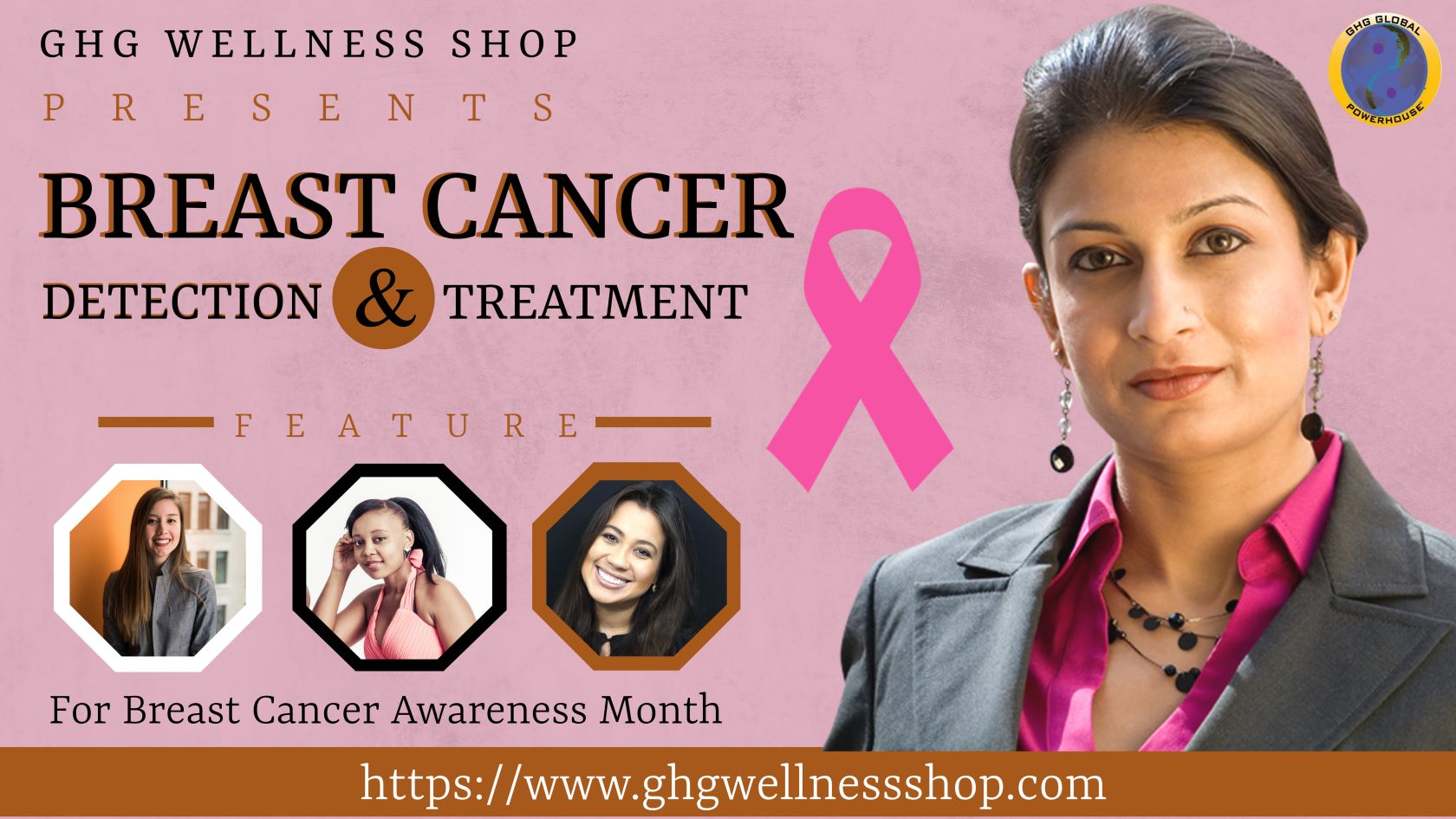Your shopping bag is empty
Breast Cancer Awareness
- Posted by: Gillian Gaspard
- Comments: 0
- Categories: News

This month of October is "Breast Cancer Awareness Month," so today we are going to talk about Breast Cancer. Breast Cancer is a malignant Tumour that starts in the cells of the breast. Although Breast Cancer is the most common form of cancer in women, male Breast Cancer does occur and accounts for about 1% of all cancer deaths in men. In 2018, an estimated 2.09 million women were diagnosed with Breast Cancer.The fact is that women are the pillars of the family, so Breast Cancer affects not just the individual, but the entire family.
While many new Breast Cancers are diagnosed as a result of an abnormality seen on a mammogram or lump, a change in the consistency of the breast tissue can also be a warning sign of the disease. Hence, it is important that any new breast mass, lump or a change in the consistency of the breast tissue, should be checked by a health care professional experienced in diagnosing breast diseases. If any abnormalities are found by a screening mammogram, additional tests that can be used by physicians to diagnose Breast Cancer include an Ultrasound, MRI, Diagnostic Mammogram (very detailed examination of the breast) and a Biopsy.
Breasts should be examined every month, the best time is one week after your period. Around this time, your breasts are softer and easier to examine. The breasts are mainly examined to get to know what is normal for your breasts and to discover any changes in the breasts early. Every woman should start checking her breasts from her early teens and onward. If you have stopped having periods, do the breast examination on the same day every month. It is important to take a few minutes to examine your breasts every month, to help with the early discovery of Breast Cancer. This should be done continually throughout your life, because this practice can save your life.
Most times, cancer in the breast begins in the lobules and spreads in the ducts. The arteries can spread the cancer to other organs as well. Breast Cancer can be either non-invasive Breast Cancer or invasive ductal carcinoma. Cancer can develop due to the use of tobacco, viral infections, genetic diversity, thyroid hormone, consuming a diet high in red meat, lack of sunlight and an immune-compromised posture among other causes. The risk of getting cancer is increased with some diseases, and when combined with a lack of physical activity, or being overweight.
The type of Breast Cancer is determined by the type of cells that were damaged by the tumour. Research has found that Southeast Asia and Africa have the lowest incidence rate of Breast Cancer. The highest rates of mortality from this cancerous tumour are found in developing Countries like Fiji, Somalia, Egypt, Indonesia and Papua New Guinea.
The stages of Breast Cancer are determined by the extent of the spread of the cancerous cells and the type of cells affected. The stages are:
1) STAGE 1: Cancer here is either longer but not in the lymphatic system, or is a small cluster of tumour tissue larger than 0.2 millimetres.
2) STAGE 2: The Cancer is found in the lymphatic and circulatory systems, but not in the chest cavity.
3) STAGE 3: In this stage, there can be three variations. The Cancer can be in four to nine axillary lymphatic nodes or guardian lymph nodes.
4) STAGE 4: The Cancer spreads to other parts of the body, or organs such as the liver, the brain, the lungs, the bones etc.
The main symptoms of Breast Cancer include a lump or thickening of the breast that does not disappear after a period of time, changes in the size or shape of the breast, changes in the skin of the breast such as dimpling or a rash, breast pain that does not go away after some time, inverted nipple or unusual nipple discharge, a lump or swelling or pain in the armpit.
The actual cause of Breast Cancer is unknown, but key risk factors of Breast Cancer are genetics (where a woman has a relative or relatives) with Breast Cancer, early beginning of menstruation (before 12 years) and with the late onset of menopause (after 50 years), having a first baby at a late age (after 30 years) or having no children, obesity or being overweight. There is evidence suggesting that Breast Cancer in younger women can be more aggressive than in older women. There is research indicating, that the use of hormone replacement therapy and prolonged use of oral pregnancy prevention pills, are linked to cancer. Data appears to suggest that drinking a lot of alcohol or beers regularly, can increase the risk of developing Breast Cancer. Also, data appears to suggest that most Breast Cancers are caused by acquired mutations. Some lesions associated with abnormal cell multiplication increases the risk of cancer.
Breast Cancer is treated in various ways. It depends on the kind of Breast Cancer, and how far it has spread. People with Breast Cancer often get more than one treatment. The different treatments include Surgery (an operation where doctors cut out and remove cancer tissue), Chemotherapy (drugs used to shrink or kill the cancer like tablets or intravenous fluid), Hormonal Therapy (hormonal treatment is used to block cancer cells from getting the hormones they need to grow), Radiation (high-energy rays are used to kill the cancer cells).
Please note, that if a woman feels something different in her breast, or the doctor picks up something abnormal on examination, then further tests are needed, even in the presence of a normal mammogram. Screening does not only consist of mammograms, it involves breast awareness on the part of the patient. Screening also consists of a clinical breast exam on the part of the physician, as well as a mammogram. Screening mammography should be done annually starting at about age 40. Some patients may have to start screening earlier, if they are at high risk of Breast Cancer. These high risk patients may require an Ultrasound or MRI. Those with a very strong family history of cancer, should consider doing genetic testing. All women can assess their risk by using an online tool, found at https://bcrisktool.cancer.gov/. Detect Breast Cancer early, to save your life.
Look out for new Breast products coming next month. They include products to help with breast examination. Also, Breast products to massage the breasts, for safe breast enhancement, and to keep your breasts healthy and looking lovely. Even breast support yoga wear will be added to our online store. These products will be uploaded on our website next month.
The Breast Cancer information in this Blog, was provided with the help of the "Trinidad and Tobago Cancer Society." Women here in Trinidad & Tobago (Caribbean) can find lots of information about Breast Cancer such as Risk Factors, Breast Examination, Signs and Symptoms, and Treatments from the "Trinidad and Tobago Cancer Society." Their website can be found at https://www.cancertt.com. Their email address is projects@cancer.tt. Their contact numbers are (868) 226-1221 to phone them. Their fax number is (868) 625-8497. Their office is located on 69 Dundonald Street in Port-of-Spain, Trinidad.
.






LEAVE A REPLY
Your email address will not be published. Required fields are marked *